Hello WNVM-ers,
Welcome back! If you’ve found us in the week since we launched, you can catch up on our very first stories from last week here.
We take a break from our pre-scheduled programming — two reported ‘80s-influenced summer trend stories coming to you next week! — because Brats drops on Hulu today. Along with all the Gen X-ers in the tristate area, we attended the Tribeca Festival premiere screening last Friday. And, we came out with thoughts about director Andrew McCarthy’s documentary exploring how being branded a member of the “Brat Pack” affected him and his compatriots.
David Blum, the writer of a semi-snarky 1985 New York Magazine article, coined the term while documenting the antics of Emilio Estevez, Rob Lowe, and Judd Nelson, ostensibly the forefathers to the Leonardo DiCaprio “pussy posse” a decade later. You should definitely read the piece if you haven’t. (Be aware that, like many of the Brat Pack films, parts of it haven’t aged well. The portrayal of young women and the frequent use of the word “ethnic,” including in relation to Nicholas Cage, would not pass muster today.)
McCarthy posits that being lumped in with the group, which he perceived as a derogatory term, harmed his career. He only merited a single sentence in the piece, but his proximity to the other actors in several films assured his spot as a member of the Brat Pack.
Cheryl has seen most of John Hughes’ ‘80s coming-of-age films dozens of times over (including the not-good Weird Science) and works through her art versus artist misgivings below. She went in hoping for more beyond a therapy session. Part two when?
Fawnia, an Emilio Estevez circa-Young Guns, Ghost-and-beyond Demi Moore, and Kim Cattrall in Mannequin girlie, went in with basic background on the Brat Pack phenomenon and surrounding discourse, with minimal to zero emotional attachment. She came out thinking that Andrew McCarthy, ironically, comes across like a privileged brat, and realizing that she’s not particularly nostalgic for this period that pre-dated her formative years. But, the experience did lead to fully appreciating why she and her Gen X friends can’t get enough of today’s Gen Z-focused teen shows (and their cleverly cast parents, like Molly Ringwald in “Riverdale.”)
Brats spoilers ahead, and be sure to read our news links at the end.
I Remain Now and Will Always Be a Duck Man
But I wanted more from the Brats documentary.
By Cheryl
I was really excited to see Brats. I wanted to absolutely wallow in blissful nostalgia — which is expressly against the mission statement of this newsletter, sorry! — and to spend time with the people behind the movies that influenced me, understood me, and inspired me. While there were a lot of fun outtakes and interview footage that scratched the nostalgia itch (like the St. Elmo’s Fire “Man in Motion” video shoot), Brats could have been a much more vivid portrayal of the actors, the films, and who was left out at the time, which Fawnia explores beautifully below.
I tried to pretend I was a film critic and put my thoughts into a cohesive essay, but it was a disaster. So instead, I am coming at this as the non-objective fan I am and giving you the completely random thoughts I’ve had since I saw it last week.
For context, Pretty in Pink is my favorite movie of the genre. I know that The Breakfast Club is the “better” film, but Andie and that waistless nightmare of a prom dress have my heart. Plus, I knew some real-life Duckies and Steffs. Also important: I was Team Duckie all the way. Blane, the major appliance, was so mealy-mouthed and really should have fought harder for Andie. Oh, and Annie Potts (Iona) forever. So let’s get into it:
Andrew McCarthy has a chip on his shoulder the size of Jake’s dad’s car phone in Sixteen Candles. This is what I thought last year after I read his autobiography, Brat: An ‘80s Story. That opinion softened a bit after I watched Brats, but the navel-gazing grated on me. He said he realized it was a “blessing” and a “beautiful time.” But I wasn’t totally convinced he believes it yet, especially since he kept asking Blum at the panel discussion after the premiere to apologize.
Is it possible that I still conflate McCarthy with Blane and am therefore biased? Not no!
Molly Ringwald didn’t participate, but she speaks and writes about her early fame in the Brat Pack often and with self-awareness. Definitely read her New Yorker article in which she grapples with how some of the themes and lily-white casting haven’t aged well. I also recommend listening to her episode of the “Search Engine” podcast.
Listen, “Brat Pack” is a really clever term and, as a journalist, I admire David Blum for coining it. But I agree that “Brat Pack” was belittling and condescending. The word “brat” cannot be spun positively. And I don’t doubt it did hurt some of the actors’ reputations at the time. But based on the various country estates and beach mansions McCarthy visited, I’d say the Brat Pack did just fine. I am slightly worried about Ally Sheedy, though, because her couch suggested that maybe she wasn’t as well-off as some of the others. I went down a rabbit hole on her IMDb page, and now I want a whole doc just about her.
I could tell Rob Lowe really wanted to say, “Get over it, Andy.” But he had a more successful acting career, so the Brat Pack inclusion obviously didn’t affect his psyche as much long-term. I was thinking about a modern-day St. Elmo’s Fire sequel, and I can totally see Billy being a smug podcaster who talks about himself a lot (ahem).
It was disappointing not to see Judd Nelson. He told US Weekly a few weeks ago that he wanted to be excluded from the narrative. OK, Bender.
What was with the Anthony Michael Hall erasure? He was arguably more important than Jon Cryer as the non-heartthrob foil in various films. The Everykid deserves a nod at least. And, having done four John Hughes movies in a row, he was probably at the biggest risk of being typecast of all of them.

Demi Moore is an angel. And I’m not just talking about the pre-Raphaelite hair she had at the panel discussion. Moore has obviously done her time in therapy and tried to impart some of her hard-won wisdom to McCarthy. Related, her autobiography is one of the best of the Brat Pack bunch; I read it right after Brat as a palette cleanser.
Yikes, Emilio Estevez is definitely still upset. But, he is a nepo baby, so who knows how the Brat Pack label affected his career. Fawnia and I also thought dad Martin Sheen failed him. Where was the publicist who should not have let an ambitious young journalist anywhere near Estevez and his partying pals?
James Spader (sadly not really a part of the doc but bear with me here) was by far the hottest “teen” in any of the John Hughes films. I really wanted Steff to see the error of his ways and have a change of heart/personality and end up with Andie. Also, the 87 seasons of “The Blacklist,” in which Spader basically plays his “The Office” Robert California character as a mastermind criminal, got me through a large chunk of the pandemic.

McCarthy and Spader on the set of “The Blacklist.” (Photo: andrewtmccarthy/Instagram) McCarthy himself became a travel writer, wrote best-selling books, and directed TV, including several episodes of “The Blacklist.” Any one of those things counts as a successful career for normal people. Plus, Jon Cryer, who decided to be a messy bitch at the panel discussion, said McCarthy was a “dick” at the time. And I know from McCarthy’s book that he was dealing with alcohol abuse and some family issues then. So there was a lot going on that could have derailed his career. In any crop of young actors, the odds are pretty low that they all achieve a Tom Cruise (also mentioned in the article) level of fame.
McCarthy had a rarefied experience and will forever be remembered as a beloved member of a group that represented both a generation and a seismic shift in filmmaking. It’s good he realizes that now, but it’s shocking that he had no clue before this?
ABC News Studios, please give McCarthy (or someone) more money and let him do a docuseries and delve deeper into the Brat Pack. Thank you.
Smells Like Teen Spirit
I’m feeling nostalgic for the excellent YA TV out right now.
By Fawnia
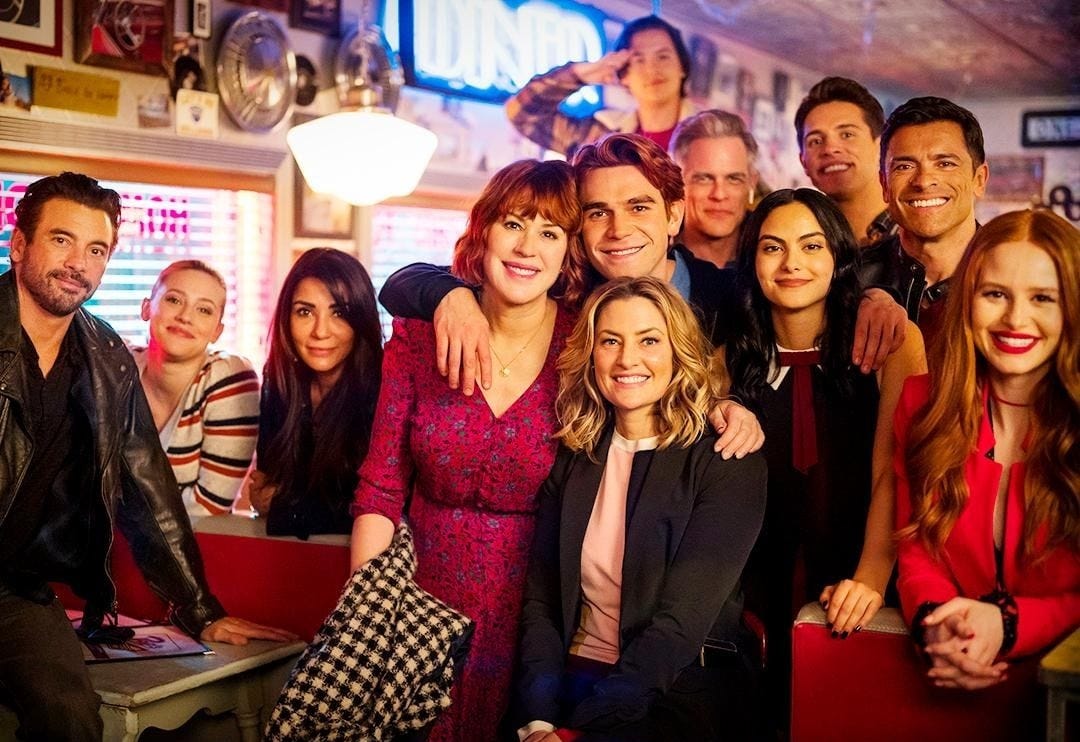
First, I fear and loathe writing hot takes. But the much-anticipated Brats is out today, and my main takeaway actually segues into a story I planned for WNVM. So that worked out! Second, and full disclosure: I don’t have a deep connection with the beloved Brat Pack-era films. Maybe because I was too young to access the suburban movie theater sans parental permission and a ride. Or, that when I did rent Sixteen Candles on VHS, I was slapped in the face with the damaging racist legacy of the character who shall not be named here — and, oh, sexual assault. I also just didn’t find a high school story that resonated with me, a Chinese American kid born and raised in the Midwest.
If I think about it, the viewing that shaped me includes “Miami Vice,” New Jack City, and “Club MTV” — also portrayals of dreamer outsiders aspiring for the glamorous life. That said, I still appreciate Pretty in Pink for showing me how fashion, through Marilyn Vance’s costumes, is a powerful tool of self-expression and individuality. (Andie’s thrift store outfits still slap, and Team Duckie all the way!)
My eye-opening moment from McCarthy’s documentary (and Blum’s article) is that the Brat Packers were the face of a radical cultural groundshift in mid-’80s Hollywood that continues to evolve today. Thanks to hits like 1981's Fast Times at Ridgemont High, and, two years later, The Outsiders and Risky Business, the entertainment industry realized the power and potential of the youth market.

On his tour of former cast mate reunions, McCarthy visits Rob Lowe in Sam Seaborn-meets-Chris Traeger mode. Lowe assuages a still-aggrieved McCarthy, saying, “shows like “Glee” and The CW” would not have happened “without the Brat Pack” — which, immediately caught my attention, as a The (former) CW superfan. Now, I’m not giving the Brat Pack credit for diversifying Hollywood. But the industry has maintained its emphasis on youth, and forty years later, on-screen teen stories better reflect the makeup of the United States. Zoomers are the most diverse generation in history and strongly embrace identity. Plus, a vast majority of the cohorts — wielding a disposable income of $360 billion — value multicultural and diversity efforts in their consumer behavior. (Of course, there’s a lot more progress to be made, and “the end of peak TV” is a real concern.)
Meanwhile, Brats kind of acknowledged the absolute lack of inclusion in the game-changing filmography through brief interviews with author Malcolm Gladwell and writer and “Keep It” podcast host Ira Madison III. They did their best as the two voices elevating the underrepresented community kept out of (or harmed by) these movies.
I really felt like McCarthy’s lightbulb realization via Lowe was a missed opportunity, not just to address the white elephant in the room. But it was also an opening for the doc to give a platform to a diverse set of voices to discuss what the Brat Pack oeuvre meant to them, and how those films influence the shows we watch today.
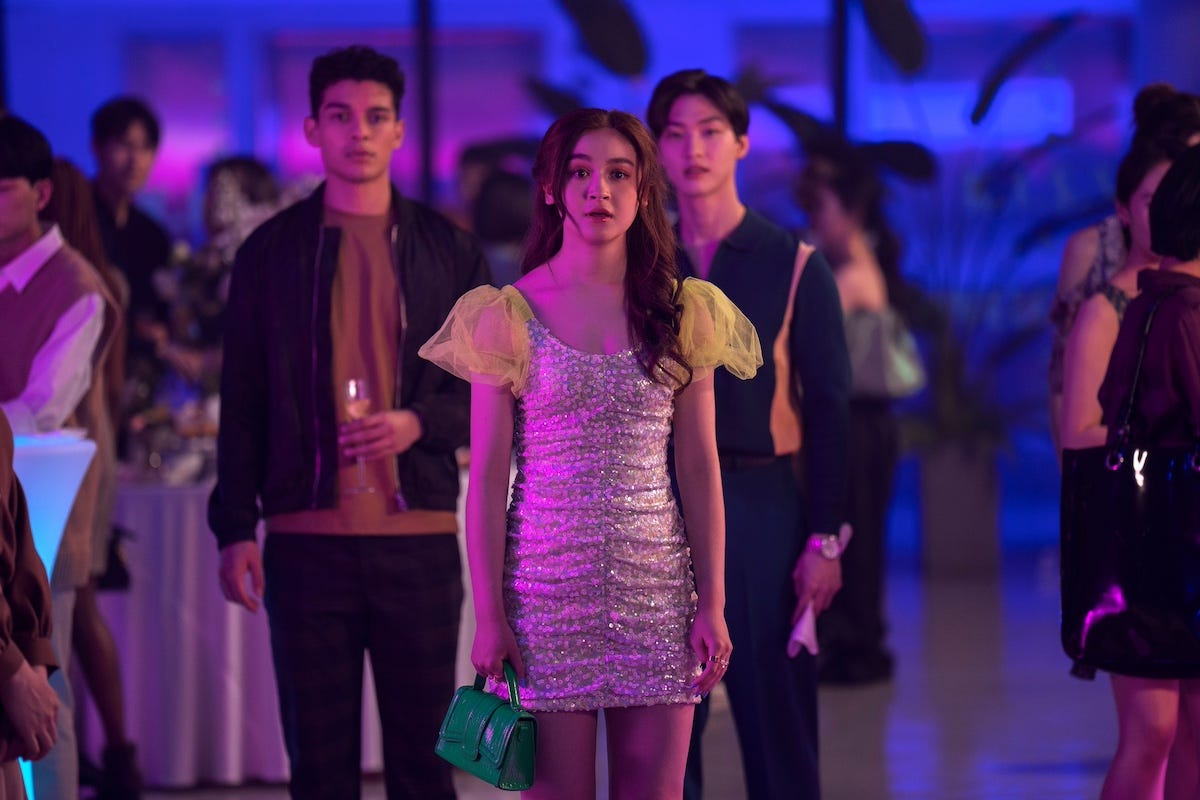
For instance, Korean American author, writer, and producer Jenny Han has shared how much John Hughes movies — and Sixteen Candles — influenced her popular books-turned-into shows/movies, like the To All the Boys I’ve Loved Before trilogy and the glittering, Seoul international school-set, “XO, Kitty.” Auteur Adil El Arbi (one-half of helming duo Adil & Bilal, with Bilal Fallah) referenced “all the John Hughes movies” for directing episodes of 2022’s “Ms. Marvel.” The series cleverly (and delightfully) used burgeoning superpowers as an analogy for a Jersey-born Pakistani-American teen exploring and welcoming her multicultural history and identity. (Also, featuring the most wonderful Bon Jovi tribute.)
Teenage stories — feeling like an outsider, discovering first love, reaching new and nuanced understandings with family and friends, and, most importantly, finding yourself — are universal, no matter the time period or age. My Gen X friends, who are mostly Asian American, regularly text each other for recommendations for the latest teen fare. And the lists aren’t for someone’s kids, it's for us to almost have this glorious redo of our formative, latchkey kid years spent watching TV. I can finally see myself in these adventures — and feel welcomed into illuminating new experiences, relatable, but still different from mine.
In a season one episode of “grown-ish,” freshmen twins Jazz and Sky (Chloe and Halle Bailey) catch sophomore Aaron’s (Trevor Jackson) flu and lean on each other — with no parental support — in “the sick room.” That comedic set-up conjured that exact exhilarating feeling I experienced with my found family in the dorms so long ago. In the absurdly genius Y2K-set “PEN15,” Maya (Maya Erskine, playing a version of her hormonal 13-year-old self) confronts the casual racism of her middle school classmates toward her Japanese heritage (through a Spice Girls sequence, no less), and ultimately her white best friend Anna (Anna Konkle) has her back. Maya also reaches new appreciation in the fraught relationship with her mom, Yuki (Erskine’s real mother, Mutsuko). The entire episode hit home to those unmoored, awkward years, while making me laugh and cry. Wait, is that nostalgia that I’m feeling?
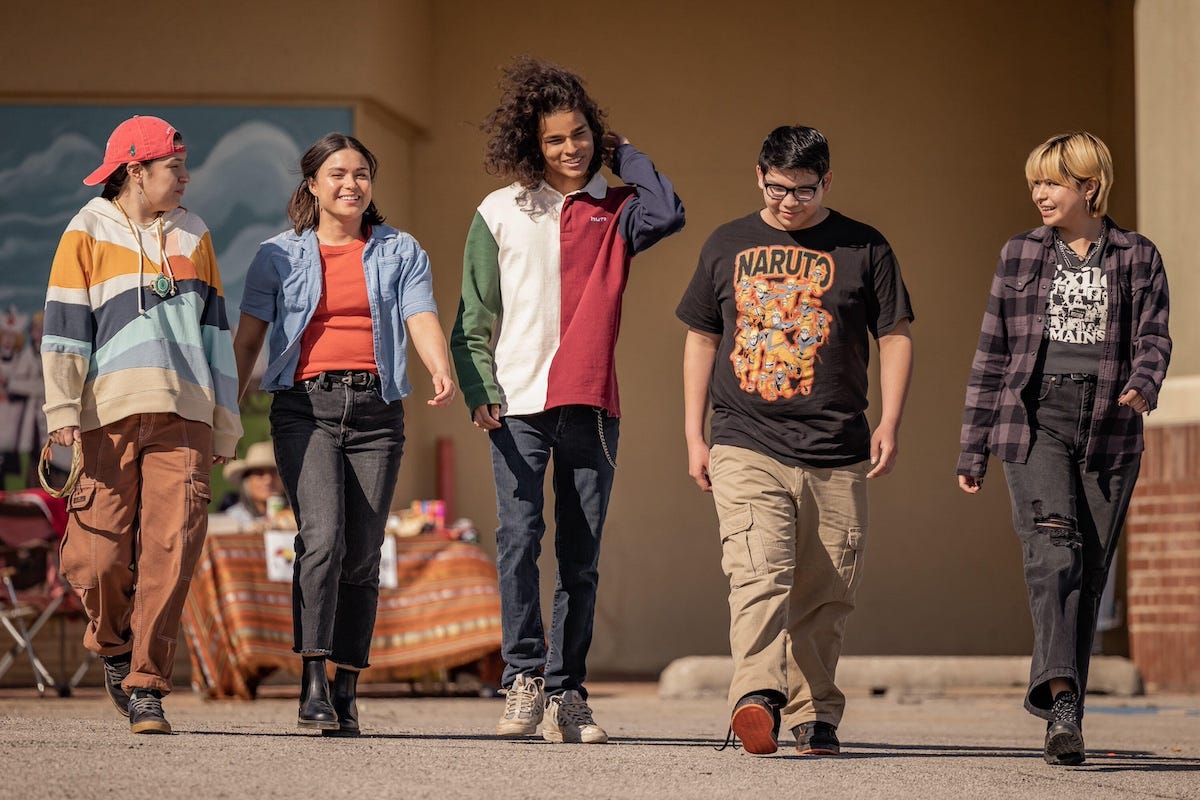
I’m constantly riveted by super smart writing, innovative direction, and blazing young talents. “Reservation Dogs” deserves ALL the Emmys attention for its singular storytelling about the hopes, dreams, heartbreak and friendship amongst Native teens in Oklahoma. I love the supernatural-infused capers in “On My Block,” wilderness survival in “Yellowjackets,” it's not just football in “All American,” the sweet, sweet British kids in the queer-centered “Heartstopper” … “Never Have I Ever,” “Riverdale,” “American Born Chinese,” “Wednesday,” “The Summer I Turned Pretty,” “Dead Boy Detectives,” “Sex Education,” … I could go on and am always taking new recos.
But wait, I did religiously watch the Lisa Bonet-led “The Cosby Show” (eek) HBCU-set spin-off, “A Different World,” which ran from 1987 to 1993. I loved Jasmine Guy’s quick-witted, ultra-chic socialite with layers, Whitley Gilbert. As the cast pointed out 30 years later, during their recent HBCU tour to raise scholarship funds, the show was tackling issues at the forefront of discussion today: campus protests, affirmative action, race and more. Because, like their inventive fashion that adults end up copying, young people are always on the front line of socio-political and cultural conversations — and change.
So, instead of looking back at nostalgia that didn’t speak to and was not made for me, I’m looking forward — especially to the next seasons of “XO, Kitty” and “Heartstopper.”
You Oughta Know
This long and satisfying oral history of Gremlins, celebrating its 40th anniversary, is so fun. “They’re anarchists, quite honestly. They don’t follow any rules. And I think that not only 10-year-olds, but I think secretly a lot of 40- and 50-year-olds love that idea and live through the Gremlins vicariously,” said lead actor Zach Galligan. (The Ringer)
Gen Z and 50-something women both love stilettos, allegedly. (WSJ)
This amazing Sorellina gold and diamond cassette tape pendant, which won a design award, comes with an opal-topped gold “pencil” for winding(!!) (Instagram)
Don’t sleep (har har) on AMC+’s smoking hot update of “Interview With a Vampire,” also featuring X icon Eric Bogosian in the Christian Slater reporter role and gorgeous costumes. (IndieWire)
The first Will Smith and Martin Lawrence Bad Boys cop comedy movie came out in 1995. The fourth in the series, Bad Boys: Ride or Die, is the first film this summer to exceed box office expectations. (The Hollywood Reporter)


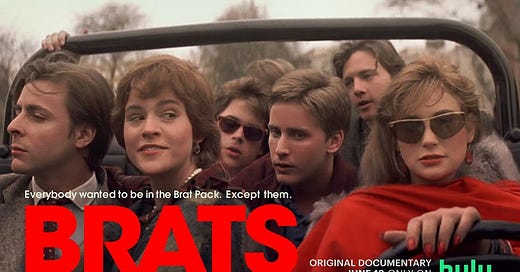


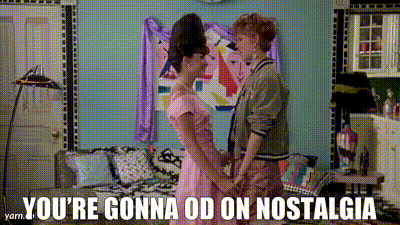
Anthony Michael Hall!! I need answers
We loved it at TGM!! https://shorturl.at/14NdE